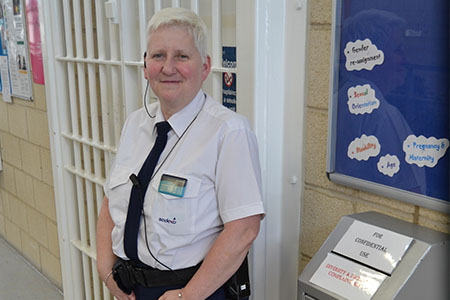Pauline Painter – Prison Custody Officer, Safer Custody team
Pauline Painter decided to leave her career in social care and search for a role that offered flexibility and could fit in with her family’s busy life. Thirteen years later, family life might have altered but her enjoyment of her prison custody officer (PCO) role at HMP & YOI Bronzefield has not.
A career that lasts: we ask why one long-serving employee chooses to stay at HMP & YOI Bronzefield
Joining the criminal justice system at 38 years old may not have seemed like an obvious career move to many but for Pauline Painter it has proved to be the right decision: “I had four young children and to make sure I was around when they needed me, I’d been working nights as a home carer. As the children got a bit older, I started looking for a role where I could work during the days instead. I knew that working with people was something I wanted to continue, the PCO role fitted with my life at the time and it’s carried on fitting for the last 13 years, partly because of the variety of challenges that I’ve been able to try my hand at.”
 Starting out at the Sodexo-managed prison, Pauline worked on the houseblocks including houseblock 2 where new residents often start and the separation and care and healthcare units where Pauline was promoted to a Senior PCO. Then followed a stint in the prison’s gym where Pauline helped residents adopt healthy lifestyles and learn the importance of exercise.
Starting out at the Sodexo-managed prison, Pauline worked on the houseblocks including houseblock 2 where new residents often start and the separation and care and healthcare units where Pauline was promoted to a Senior PCO. Then followed a stint in the prison’s gym where Pauline helped residents adopt healthy lifestyles and learn the importance of exercise.
But it was in Safer Custody where Pauline really found her fit: since joining the team in 2016, Pauline is responsible for providing support to residents at risk of self-harm as well as working to reduce violence on site. The Safer Custody team are also often the first port of call for residents who are unsure how to seek help. Pauline explains: “In Safer Custody, a big part of the job is making time to just listen to people. We sit and understand resident – and staff – concerns and we signpost people to appropriate support services."
"Actually that’s one of the best things about the Safer Custody role, having the chance to help people find the positive in their situation."
Sometimes finding that silver lining for a resident can be hard, even for an experienced PCO like Pauline: “It’s a real challenge when you find a problem you can’t fix. For example when women are in custody for a very short period and we know they’re leaving here potentially homeless, it’s hard to see a way to help and I wish we could do more. Often the same women return to us on a ‘revolving door’ basis. I always try to meet with them when they return to catch up and understand their situation. It’s possible there might be a change that is the change they need.”
Safer Custody might be Pauline’s day job but she also works at part of the Bronzefield Care Team. This team, made up of staff volunteers, supports employees in dealing with incidents and challenges in both their professional and personal lives. For the last three years, Pauline has supported her peers as they go through difficult times and, in fact, following her own illness, she set up an offshoot group named Time for You. The group is for Bronzefield employees who are undergoing cancer treatment, or who have a family member experiencing the same. Under Pauline’s stewardship, the group meets once a month answering questions, offering support and providing a way to decompress: “When I returned from long term sick leave, lots of people asked me about my cancer journey. I found so many people were going through the same thing or had family members who were that I decided to form the group as a way of connecting and supporting each other. It’s actually lots of fun – we go on days out in London and other normal things that people might otherwise miss out on.”
But it’s working with residents that has kept Pauline at Bronzefield for so many years: “I can’t think of any job I’d rather do. I’ve stayed because getting residents to a better place is really the most rewarding thing: I remember one lady who used to self-harm every day. I used to go and play games with her in the healthcare day room and gradually got her to open up to me. Working together we got her reunited with her family. The day she left, she was a different person and I really felt very proud to have played a part in that.”
But, even after 13 years working in a prison, Pauline can still find the smallest things surprising: “When women turn around and say thank you, that word is so important and powerful. It shows that all the time and effort has been worthwhile, that a woman has listened and does care about making a change. When women leave with self-esteem and confidence, it gives you hope that they are going to be a success.”